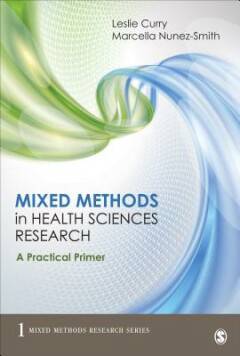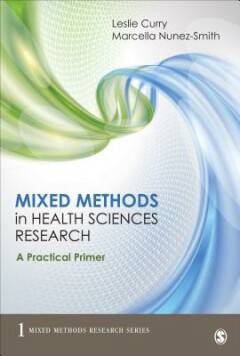
- Retrait gratuit dans votre magasin Club
- 7.000.000 titres dans notre catalogue
- Payer en toute sécurité
- Toujours un magasin près de chez vous
- Retrait gratuit dans votre magasin Club
- 7.000.000 titres dans notre catalogue
- Payer en toute sécurité
- Toujours un magasin près de chez vous
114,45 €
+ 228 points
Description
Mixed Methods in Health Sciences Research: A Practical Primer, by Leslie Curry and Marcella Nunez-Smith, presents key theories, concepts, and approaches in an accessible way. Packed with illustrations from the health sciences literature, this ready-to-use guidebook shows readers how to design, conduct, review, and use mixed methods research findings. Helpful checklists, figures, tables, templates, and much more give readers examples that will elevate the quality of their research, facilitate communication about their methods, and improve efficiency over the course of their projects. Real-world examples and insights from mixed methods researchers provide unique perspectives on every aspect of mixed methods research. This book successfully pulls together foundational mixed methods principles, synthesizes the knowledge base in the field, and translates it for a health science researcher audience. "The content is highly applicable to real life research teams in the areas of clinical research, health services research, and implementation science, providing sound content and practical advice. The authors have synthesized and pull key concepts from a variety of sources to provide a concise resource." --Linda M. Herrick, South Dakota State University "Everything from the references, to the topics, checklists, conceptual graphic representations, and organizers, interviews, and resources, all contribute to the content and aid with understanding and/or application. ... It addresses specific MM research as it pertains to health sciences in a way that other texts just do not even attempt." --Denise L. Winsor, University of Memphis "[This text is] a very pragmatic approach to mixed methods research; excellent resources, tables, and figures [are] provided, along with cases and examples of value to researchers and grant reviewers. Its relevance to practice, education, and research, as well as to potential policy implications, is a strong focus that would make this a valued textbook for any researcher!"
? --Karen Devereaux Melillo, University of Massachusetts Lowell "The text is cutting edge. It leads the way with its focus on team dynamics. [The authors] succeed in making the book relevant and practical. They also articulate a number of key insights in the area of mixed methods that rarely get addressed, such as teams and conflict. Great read with a lot of good, practical information for mixed methods researchers at all levels. The practical approach of this text makes it an innovative and valuable resource." --John G. Schumacher, University of Maryland
? --Karen Devereaux Melillo, University of Massachusetts Lowell "The text is cutting edge. It leads the way with its focus on team dynamics. [The authors] succeed in making the book relevant and practical. They also articulate a number of key insights in the area of mixed methods that rarely get addressed, such as teams and conflict. Great read with a lot of good, practical information for mixed methods researchers at all levels. The practical approach of this text makes it an innovative and valuable resource." --John G. Schumacher, University of Maryland
Spécifications
Parties prenantes
- Auteur(s) :
- Editeur:
Contenu
- Nombre de pages :
- 432
- Langue:
- Anglais
- Collection :
- Tome:
- n° 1
Caractéristiques
- EAN:
- 9781483306773
- Date de parution :
- 20-10-14
- Format:
- Livre broché
- Format numérique:
- Trade paperback (VS)
- Dimensions :
- 155 mm x 226 mm
- Poids :
- 576 g







